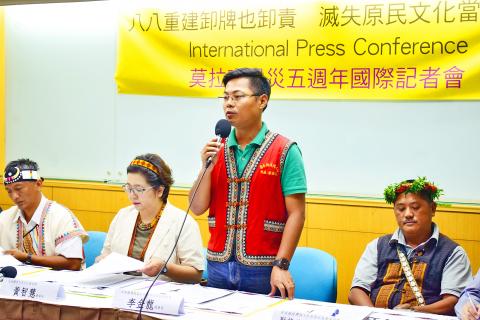As the government celebrates what it termed the “successful reconstruction” of areas devastated by Typhoon Morakot in 2009 and launched an exhibition highlighting reconstruction results, Morakot survivors yesterday accused the government of lying, saying that reconstruction is far from complete.
Morakot is considered the worst storm to hit the nation in 50 years; its massive mudslides caused almost 700 deaths, permanently changed the landscape and forced thousands of people to relocate.
Siaolin Village (小林) in what is now Jiasian Township (甲仙), Greater Kaohsiung, was completed buried by mudslides.

Photo: Courtesy of the Taiwan Association for Human Rights
While the government celebrates what it called the completion of reconstruction five years after the disaster, many survivors disagreed.
“When reconstruction efforts started, the government promised that people would not be relocated too far from where they originally lived, but it is a lie,” Huang Chih-huei (黃智慧), director of Millet Foundation of Indigenous Peoples, told a news conference in Taipei. “The government relocated Rukai residents of Ali Village (阿里) to a different township, forcing them to spend NT$500 per day on gas to drive to and from work on fields in their original village,” Huang said. “It is impossible for these villagers to farm as they used to.”
“In addition, each household has been moved to a house of 16 ping [52.8m2], where it is very difficult for a big family to live,” he said.
Lee Jin-long (李金龍), director of the Industrial Development Association for the Rukai Village of Kocapognan, agreed.
“Ali Village residents were evicted and relocated without their consent, despite the original village not being too seriously damaged,” Lee said. “Besides, the government never asked for their opinions before building the new village, making it a place with no connection to Rukai culture and tradition.”
Lee said that although they have houses, their lives have not been rebuilt, since their farmlands are far away.
Isnankan Dahay, a resident of the Bunun Aboriginal Village of Nansalu (南沙魯) in Namasiya District (那瑪夏), Kaohsiung, said that at the time, the government promised to allocate farmland to each household, “but it never happened.”
With no source of income, many villagers — himself included — moved back to the original village where they have farms, he said.
“The government said that Nanshalu wouldn’t be suitable for residents for at least 50 years,” Dahay said. “Well, I’ve been back for five years now and everything is fine.”
Taiwan Association for Human Rights Secretary-General Tsai Chi-hsun (蔡季勳) said that many people — especially Aborigines forced to relocate — are still struggling to rebuild their lives, but the government is not helping, but rather is creating obstacles for them.
“This is why we’ve always stressed the importance of information transparency and public participation in decisions,” Tsai said. “Otherwise, anyone could be forced to relocate or give up their lifestyle due to government decisions.”

TRAGEDY STRIKES TAIPEI: The suspect died after falling off a building after he threw smoke grenades into Taipei Main Station and went on a killing spree in Zhongshan A 27-year-old suspect allegedly threw smoke grenades in Taipei Main Station and then proceeded to Zhongshan MRT Station in a random killing spree that resulted in the death of the suspect and two other civilians, and seven injured, including one in critical condition, as of press time last night. The suspect, identified as a man surnamed Chang Wen (張文), allegedly began the attack at Taipei Main Station, the Taipei Fire Department said, adding that it received a report at 5:24pm that smoke grenades had been thrown in the station. One man in his 50s was rushed to hospital after a cardiac arrest

A car bomb killed a senior Russian general in southern Moscow yesterday morning, the latest high-profile army figure to be blown up in a blast that came just hours after Russian and Ukrainian delegates held separate talks in Miami on a plan to end the war. Kyiv has not commented on the incident, but Russian investigators said they were probing whether the blast was “linked” to “Ukrainian special forces.” The attack was similar to other assassinations of generals and pro-war figures that have either been claimed, or are widely believed to have been orchestrated, by Ukraine. Russian Lieutenant General Fanil Sarvarov, 56, head

SAFETY FIRST: Double the number of police were deployed at the Taipei Marathon, while other cities released plans to bolster public event safety Authorities across Taiwan have stepped up security measures ahead of Christmas and New Year events, following a knife and smoke bomb attack in Taipei on Friday that left four people dead and 11 injured. In a bid to prevent potential copycat incidents, police deployments have been expanded for large gatherings, transport hubs, and other crowded public spaces, according to official statements from police and city authorities. Taipei Mayor Chiang Wan-an (蔣萬安) said the city has “comprehensively raised security readiness” in crowded areas, increased police deployments with armed officers, and intensified patrols during weekends and nighttime hours. For large-scale events, security checkpoints and explosives

PUBLIC SAFETY: The premier said that security would be tightened in transport hubs, while President Lai commended the public for their bravery The government is to deploy more police, including rapid response units, in crowded public areas to ensure a swift response to any threats, President William Lai (賴清德) said yesterday after a knife attack killed three people and injured 11 in Taipei the previous day. Lai made the remarks following a briefing by the National Police Agency on the progress of the investigation, saying that the attack underscored the importance of cooperation in public security between the central and local governments. The attack unfolded in the early evening on Friday around Taipei Main Station’s M7 exit and later near the Taipei MRT’s Zhongshan